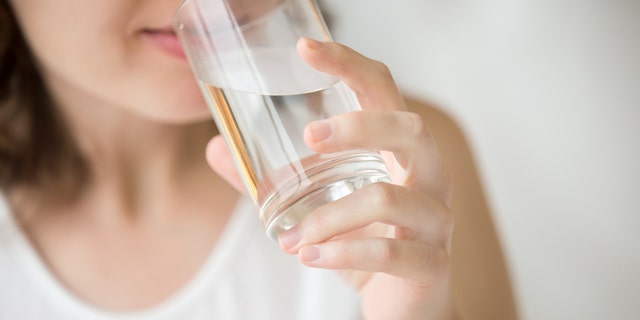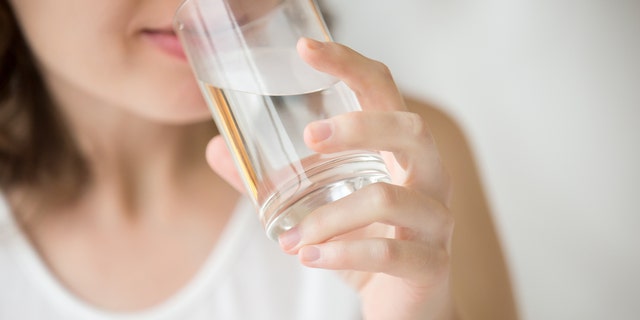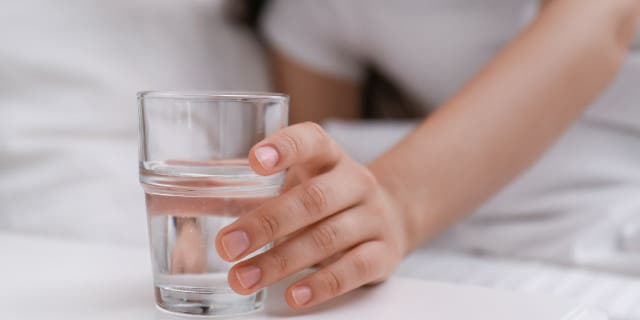
Nearly half of people worldwide do not get the recommended daily total water intake, a new report indicates
Yet drinking enough water may help to delay the aging process for many.
A recent study by the National Institutes of Health (NIH) published in eBioMedicine suggests as much — though there are caveats to know.
SHOULD YOU DRINK WATER BEFORE BED? EXPERTS CHIME IN
“The results suggest that proper hydration may slow down aging and prolong a disease-free life,” said Natalia Dmitrieva, PhD, a study author and researcher in the Laboratory of Cardiovascular Regenerative Medicine at the National Heart, Lung and Blood Institute in Bethesda, Maryland, in a news release.
The researchers looked at the link between sodium levels in blood and certain health markers — and explained that blood sodium levels increased when fluid intake decreased.

Staying well-hydrated is associated with better health, fewer chronic conditions and longer life, a new study suggests. Fox News Digital talked to several physicians, who shared some key caveats.
(iStock)
Adults who had serum sodium levels at the higher end of a normal range were more likely to die at a younger age.
They were also more likely to develop chronic conditions and show signs of advanced biological aging, compared to those whose levels were in the medium ranges, the NIH report said.
The study’s authors explained that hydration plays a role in serum sodium levels.
A normal serum sodium range should be between 135-146 milliequivalents per liter (mEq/L), according to the NIH release.
The study’s authors explained that hydration plays a role in serum sodium levels.
NEW COVID OMICRON SUBVARIANT XBB.1.5 IS ‘SPREADING LIKE WILDFIRE’ IN US: HEALTH EXPERTS REVEAL WHY
“Decreased body water content is the most common factor that increases serum sodium, which is why the results suggest that staying well-hydrated may slow down the aging process and prevent or delay chronic disease,” they said.
The team collected data from 11,255 participants over a 30-year period.

Staying well-hydrated was also associated with better health, fewer chronic conditions and longer life, a new study said.
(iStock)
The NIH release indicated that the team found that serum sodium greater than 142 mmol/l for those who are middle-aged is associated with a 39% increased risk of developing chronic diseases — and up to a 64% increased associated risk for developing dementia and chronic diseases such as diabetes, stroke, atrial fibrillation, heart failure, and peripheral artery disease.
Randomized, controlled trials are needed to determine if the optimal amount of fluid intake can help prevent disease and promote healthy aging.
Staying well-hydrated was also associated with better health, fewer chronic conditions and longer life, the study said.
The researchers also found that participants with serum sodium levels above 144 mEq/L had a 50% increased risk of being “biologically older” than their actual age — while those around the 142 mEq/L mark had up to a 15% increased risk, compared to those who had ranges between 137 and 142 mEq/L
IS STRETCHING PART OF YOUR ROUTINE IN THE NEW YEAR? HERE’S HOW TO DO IT RIGHT
Adults with levels between 144.5 and 146 mEq/L presented a 21% increased risk of premature death compared to those with ranges between 137-142 mEq/L, the NIH report also said.
The study’s authors found that adults with serum sodium levels between 138-140 mEq/L had the lowest risk of developing chronic disease.

The correlations found in the study can be helpful in guiding an individual’s behavioral habits and be informative to clinicians, the researchers said.
(iStock)
The NIH release, however, noted that the researchers’ findings do not prove a causal effect — and that randomized, controlled trials are needed to determine if the optimal amount of fluid intake can help prevent disease and promote healthy aging.
The researchers said the correlations found in the study can be helpful in guiding an individual’s behavioral habits and be informative to clinicians.
POTATOES AREN’T ALWAYS BAD FOR YOU — IT’S ALL IN THE PREPARATION, NEW STUDY INDICATES
“People whose serum sodium is 142 mEq/L or higher would benefit from [an] evaluation of their fluid intake,” Dmitrieva said in the NIH release.
It is important for people to discuss with a physician how much water intake is appropriate for them and their individual situations.
People can increase their fluid intake with water as well as with juices, vegetables and fruits with high water content, she said in the release.
Health experts said certain medical conditions could also affect fluid intake or a need for fluid restriction — so it is important for people to discuss with a physician how much water intake is appropriate for them and their individual situations.
“The goal is to ensure patients are taking in enough fluids, while assessing factors, like medications, that may lead to fluid loss,” said Manfred Boehm, M.D., a study author and director of the Laboratory of Cardiovascular Regenerative Medicine, in the NIH release.

“The authors’ findings are in keeping with advice many of us received from our mothers — drink six to eight glasses of water every day,” said one physician.
(iStock)
Boehm also said in the release, “Doctors may also need to defer to a patient’s current treatment plan, such as limiting fluid intake for heart failure.”
Deepak L. Bhatt, M.D., MPH, is director of Mount Sinai Heart Icahn School of Medicine at Mount Sinai Health System in New York City. He was not part of the study, but he told Fox News Digital that the findings were interesting and provocative.
“The authors’ findings are in keeping with advice many of us received from our mothers — drink six to eight glasses of water every day,” he said.
“Staying well-hydrated is probably a good idea, though for the average healthy person, I wouldn’t say to drink more water unless you are thirsty.”
“More recently, that conventional wisdom has been challenged, with experts instead recommending drinking water only when actually thirsty and not on a schedule.”
Bhatt cautioned, “Older adults or those with some degree of dementia … may lose their sense of thirst — and in those situations, more scheduled water consumption can sometimes be useful.”
Bhatt, who is also a professor of cardiovascular medicine at Icahn School of Medicine at Mount Sinai Health System, pointed out that the investigators examined sodium levels — and it was not a direct study of the amount of daily water intake.
“To prove that drinking more water actually improves health would require a gold-standard, randomized trial,” he said.
“Bottom line: Staying well-hydrated is probably a good idea, though for the average healthy person, I wouldn’t say to drink more water unless you are thirsty,” he added.

When more people are working from home today, said one health professional, it’s perhaps “more important not to lose track of time and to make sure you are getting enough water to stay well-hydrated.”
(iStock)
“Perhaps, in this peri-pandemic period where some people may be working from home and glued to a computer, it is more important not to lose track of time and to make sure you are getting enough water to stay well-hydrated.”
Dr. Marzena Gieniusz, an internist and geriatrician in the Department of Medicine and Division of Geriatrics and Palliative Medicine at Northwell Health in New York, told Fox News Digital, “An important thing to take from this study is that more research needs to be done to understand the dynamics between hydration and aging, and how to best optimize hydration in the setting of various conditions, and on an individual level to improve health and outcomes.”
FITNESS FAIL? EQUINOX GYM’S SHAMING OF NEW YEAR’S RESOLUTIONS RAISES THE EYEBROWS OF EXERCISE EXPERTS
She added, “The findings of this study do not prove a causal effect — and more hydration is not synonymous with better hydration, healthier aging and better outcomes for everyone. This is important to understand.”
Dr. Gieniusz, also an assistant professor at the Zucker School of Medicine at Hofstra/Northwell, said as well, “Optimal hydration depends on the individual and the body’s needs, which are affected by various factors including, but not limited to, activity level, medical conditions, weather, etc.”
She noted, “When it comes to recommendations about how much water or fluids we should drink, it depends on the individual. The standard 6-8 cups per day does not apply to everyone.”
“The body is designed to self-regulate and maintain balance — although self-regulation and maintaining balance becomes more challenging as we get older.”
Added Gieniusz, “The human body is very complex — and we are still learning how the various systems work independently and interact with each other, including the system of using and balancing salt and fluids in the body.”
She said, “We do know that the body is impressively designed to self-regulate and maintain balance — although self-regulation and maintaining balance becomes more challenging as we get older.”
CLICK HERE TO SIGN UP FOR OUR HEALTH NEWSLETTER
For example, she said, “with aging, we often experience a decline in our thirst sensation, so older adults may drink [fewer] fluids, which may increase their risk of fluid depletion or dehydration — and that can sometimes lead to complications. Yet sometimes it can actually be a good thing.”
She added, “Certain medical conditions (e.g. heart failure), which are more common in older adults, may benefit from limiting fluid and/or salt intake, and some patients even take medications to rid the body of water in order to better manage their medical conditions.”
CLICK HERE TO GET THE FOX NEWS APP
The current guidelines from the National Academies of Medicine suggest women should drink 6-9 cups (1.5-2.2 liters) daily and men should drink 8-12 cups (2-3 liters) daily, according to the release.
 Latest Breaking News Online News Portal
Latest Breaking News Online News Portal





